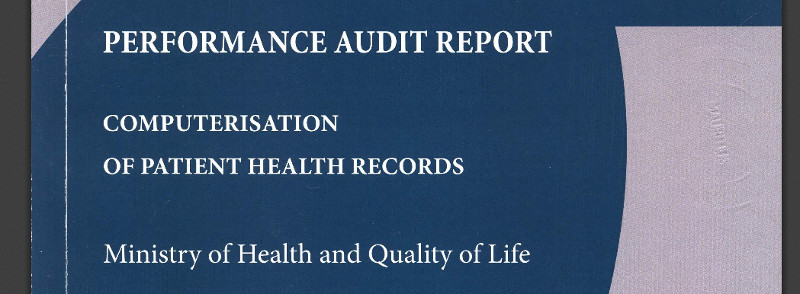During a discussion about the “deletion of biometric data” on the Mauritius Internet Users mailing list, there was a mention of a performance report that said:
“Over the past 23 years, most of the initiatives towards taken by MoHQL towards the computerisation of patient health records have not been successfully implemented and the different systems developed so far to generate these records have not been used as intended.”
The report was prepared by the National Audit Office for the Ministry of Health and Quality of Life (MoHQL).

The report draws attention to the Rs 115 million spent on computerised systems since 1990 and Rs 17 million spent on consultancy services for the e-Health project between 2009 and 2014, and that the e-Health project does not deliver what it was intended to.
Why the system needed to be computerised?
Criticism relating to incomplete/missing patient health records, which in turn affect the quality of service, appear to be the main reason. MoHQL made significant investments in the computerisation of the operations of Public Health Institutions. Public is still not satisfied as the problems remain unsolved.
What does the report say?
Despite having a computerised system at Medi Clinics and Area Health Centres, some patient health information were still kept manually.
As at May 2016, out of the 18 modules developed for the Integrated Health Management System at the Cardiac Centre, only one module was being used.
At Bel Air and Triolet Area Health Centres all hardware intended for the Integrated Patient Care System (ICPS) were stacked in the store. No ICPS was available.
I recommend having a look at the performance report by the National Audit Office, if one is interested in identifying the impediments to an effective e-Health project in Mauritius.
Biometric ID card & e-Health
I listened to the Minister of Technology, Communication & Innovation, (Hon) Yogida Sawmynaden, on Top TV on 27 March 2017. He boasted about the e-Health project as one of the great benefits of the biometric identity card. The minister and many officials of the MNIC unit fail to distinguish between an identity number and biometric data. In order for the e-Health project to operate every patient requires a unique identity which the identity number already provides. The biometric data in that card has no utility when someone is admitted to a hospital or goes there for a medical check-up. Hospitals do not have identity card readers to read fingerprints and compare with fingerprint minutiae. As per the statement of the minister on Top TV, when someone presents his biometric identity card at the hospital counter, the bar code printed at the back of his identity card is scanned and that allows for a search in the hospital’s registry.
The usage of the card is thus simple and it requires no biometric data for the card to work with the computerised system of hospitals. An effective e-Health project relies on fixing the issues raised in the performance report and not compelling all citizens of Mauritius to give their fingerprints to the MNIC unit.
What did the Ministry say about the report?
I quote the ministry’s reply from the report itself:
The Health Records, Physiotherapy and Radiology Departments were the main users of the IHMPCS. The project did not start at some Departments or was later dropped because of lack of staff commitment.
IHMS was not functioning from the very start mainly because of camouflaged low user acceptability and readiness, lack of commitment, and inadequate IT support.
IPCS was not functioning mainly because of lack of leaders to drive the project, user resistance, insufficient training, and hardware and software problems.
The Ministry was working on a Health Information Act which would take into account the retention periods of all paper documents used by our health institutions.
IHMPCS - Integrated Hospital Management and Patient Care System IHMS - Integrated Hospital Management System IPCS - Integrated Patient Care System
Conclusion
The biometric identity card is a tiny component of the e-Health project providing a unique identity to every patient. The biometric data collected by the MNIC unit has no use in the e-Health project. There is a lack of commitment by MoHQL staff with regards to computerisation. Replacing the laminated identity card with a biometric identity card do not solve the issues raised in the performance report.